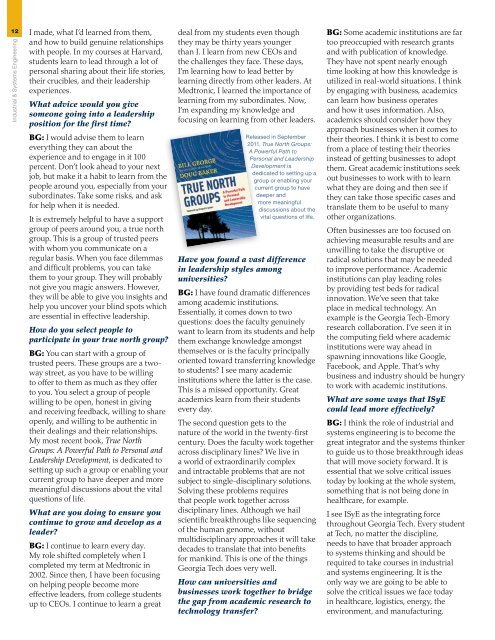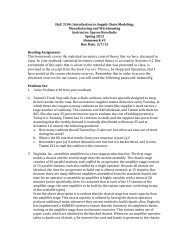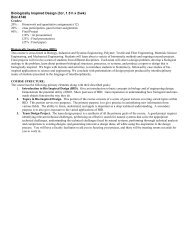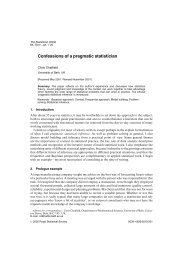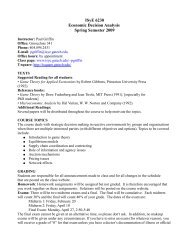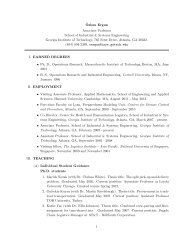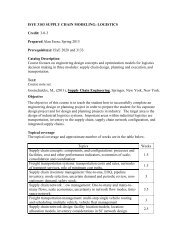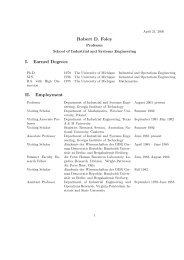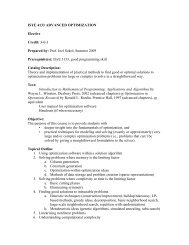Fall 2011 - H. Milton Stewart School of Industrial & Systems ...
Fall 2011 - H. Milton Stewart School of Industrial & Systems ...
Fall 2011 - H. Milton Stewart School of Industrial & Systems ...
You also want an ePaper? Increase the reach of your titles
YUMPU automatically turns print PDFs into web optimized ePapers that Google loves.
12<br />
<strong>Industrial</strong> & <strong>Systems</strong> Engineering<br />
I made, what I’d learned from them,<br />
and how to build genuine relationships<br />
with people. In my courses at Harvard,<br />
students learn to lead through a lot <strong>of</strong><br />
personal sharing about their life stories,<br />
their crucibles, and their leadership<br />
experiences.<br />
What advice would you give<br />
someone going into a leadership<br />
position for the first time<br />
BG: I would advise them to learn<br />
everything they can about the<br />
experience and to engage in it 100<br />
percent. Don’t look ahead to your next<br />
job, but make it a habit to learn from the<br />
people around you, especially from your<br />
subordinates. Take some risks, and ask<br />
for help when it is needed.<br />
It is extremely helpful to have a support<br />
group <strong>of</strong> peers around you, a true north<br />
group. This is a group <strong>of</strong> trusted peers<br />
with whom you communicate on a<br />
regular basis. When you face dilemmas<br />
and difficult problems, you can take<br />
them to your group. They will probably<br />
not give you magic answers. However,<br />
they will be able to give you insights and<br />
help you uncover your blind spots which<br />
are essential in effective leadership.<br />
How do you select people to<br />
participate in your true north group<br />
BG: You can start with a group <strong>of</strong><br />
trusted peers. These groups are a twoway<br />
street, as you have to be willing<br />
to <strong>of</strong>fer to them as much as they <strong>of</strong>fer<br />
to you. You select a group <strong>of</strong> people<br />
willing to be open, honest in giving<br />
and receiving feedback, willing to share<br />
openly, and willing to be authentic in<br />
their dealings and their relationships.<br />
My most recent book, True North<br />
Groups: A Powerful Path to Personal and<br />
Leadership Development, is dedicated to<br />
setting up such a group or enabling your<br />
current group to have deeper and more<br />
meaningful discussions about the vital<br />
questions <strong>of</strong> life.<br />
What are you doing to ensure you<br />
continue to grow and develop as a<br />
leader<br />
BG: I continue to learn every day.<br />
My role shifted completely when I<br />
completed my term at Medtronic in<br />
2002. Since then, I have been focusing<br />
on helping people become more<br />
effective leaders, from college students<br />
up to CEOs. I continue to learn a great<br />
deal from my students even though<br />
they may be thirty years younger<br />
than I. I learn from new CEOs and<br />
the challenges they face. These days,<br />
I’m learning how to lead better by<br />
learning directly from other leaders. At<br />
Medtronic, I learned the importance <strong>of</strong><br />
learning from my subordinates. Now,<br />
I’m expanding my knowledge and<br />
focusing on learning from other leaders.<br />
Released in September<br />
<strong>2011</strong>, True North Groups:<br />
A Powerful Path to<br />
Personal and Leadership<br />
Development is<br />
dedicated to setting up a<br />
group or enabling your<br />
current group to have<br />
deeper and<br />
more meaningful<br />
discussions about the<br />
vital questions <strong>of</strong> life.<br />
Have you found a vast difference<br />
in leadership styles among<br />
universities<br />
BG: I have found dramatic differences<br />
among academic institutions.<br />
Essentially, it comes down to two<br />
questions: does the faculty genuinely<br />
want to learn from its students and help<br />
them exchange knowledge amongst<br />
themselves or is the faculty principally<br />
oriented toward transferring knowledge<br />
to students I see many academic<br />
institutions where the latter is the case.<br />
This is a missed opportunity. Great<br />
academics learn from their students<br />
every day.<br />
The second question gets to the<br />
nature <strong>of</strong> the world in the twenty-first<br />
century. Does the faculty work together<br />
across disciplinary lines We live in<br />
a world <strong>of</strong> extraordinarily complex<br />
and intractable problems that are not<br />
subject to single-disciplinary solutions.<br />
Solving these problems requires<br />
that people work together across<br />
disciplinary lines. Although we hail<br />
scientific breakthroughs like sequencing<br />
<strong>of</strong> the human genome, without<br />
multidisciplinary approaches it will take<br />
decades to translate that into benefits<br />
for mankind. This is one <strong>of</strong> the things<br />
Georgia Tech does very well.<br />
How can universities and<br />
businesses work together to bridge<br />
the gap from academic research to<br />
technology transfer<br />
BG: Some academic institutions are far<br />
too preoccupied with research grants<br />
and with publication <strong>of</strong> knowledge.<br />
They have not spent nearly enough<br />
time looking at how this knowledge is<br />
utilized in real-world situations. I think<br />
by engaging with business, academics<br />
can learn how business operates<br />
and how it uses information. Also,<br />
academics should consider how they<br />
approach businesses when it comes to<br />
their theories. I think it is best to come<br />
from a place <strong>of</strong> testing their theories<br />
instead <strong>of</strong> getting businesses to adopt<br />
them. Great academic institutions seek<br />
out businesses to work with to learn<br />
what they are doing and then see if<br />
they can take those specific cases and<br />
translate them to be useful to many<br />
other organizations.<br />
Often businesses are too focused on<br />
achieving measurable results and are<br />
unwilling to take the disruptive or<br />
radical solutions that may be needed<br />
to improve performance. Academic<br />
institutions can play leading roles<br />
by providing test beds for radical<br />
innovation. We’ve seen that take<br />
place in medical technology. An<br />
example is the Georgia Tech-Emory<br />
research collaboration. I’ve seen it in<br />
the computing field where academic<br />
institutions were way ahead in<br />
spawning innovations like Google,<br />
Facebook, and Apple. That’s why<br />
business and industry should be hungry<br />
to work with academic institutions.<br />
What are some ways that ISyE<br />
could lead more effectively<br />
BG: I think the role <strong>of</strong> industrial and<br />
systems engineering is to become the<br />
great integrator and the systems thinker<br />
to guide us to those breakthrough ideas<br />
that will move society forward. It is<br />
essential that we solve critical issues<br />
today by looking at the whole system,<br />
something that is not being done in<br />
healthcare, for example.<br />
I see ISyE as the integrating force<br />
throughout Georgia Tech. Every student<br />
at Tech, no matter the discipline,<br />
needs to have that broader approach<br />
to systems thinking and should be<br />
required to take courses in industrial<br />
and systems engineering. It is the<br />
only way we are going to be able to<br />
solve the critical issues we face today<br />
in healthcare, logistics, energy, the<br />
environment, and manufacturing.


